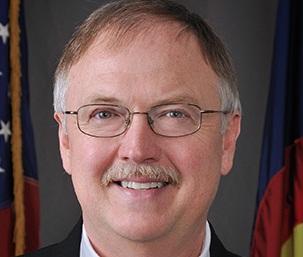
Coloradans woke to shocking news this morning. The state’s Chief of Corrections, Tom Clements, was shot to death at his home in Monument Tuesday evening. Police are investigating the killing and there’s no information yet on a suspect or motive. CPR’s Megan Verlee reports on how people who worked with Clements are taking the news of his killing.
[Listen to the full audio of Hickenloopers remarks on Tom Clements' killing here]
[The following is a transcript of Megan's report]
Reporter Megan Verlee: Governor John Hickenlooper recruited Clements for the top prisons job two years ago, just as he was retiring from running the adult corrections system in Missouri. Standing flanked by other members of his cabinet Wednesday morning, Hickenlooper fought back tears as he described the man he’d hired.
Gov. John Hickenlooper: "We are so grateful for the time that he gave us. He was a dedicated, committed, funny, caring, expert at corrections."
Reporter: According to press accounts of the 911 call, Clements’ wife contacted dispatchers shortly before 9pm to report that a man had rung the bell and then shot her husband in the chest when he opened the door. At his press conference, Hickenlooper said he had no idea about a possible motive.
Hickenlooper: "Corrections is a very difficult job. You make difficult decisions all the time that affect different people."
Scott Wasserman, Exec. Dir. CO WINS: "This sort of confirms the worse fear of every public safety officer out there. That one day you’re going to open your door and something horrible will happen."
Reporter: Scott Wasserman runs Colorado WINS, the labor group that represents Corrections officers. He remembers Clements as a director who cared deeply about the conditions inside his prisons, both for inmates and staff.
Wasserman: "He certainly set the department on a direction, and I do worry that we lose momentum on a number of issues. And I think as we move forward, we’ll just have to make sure that we stay on track."
Reporter: Clements' time at the DOC was marked by changes. The recession led prison guards to endure several years of pay cuts. Big drops in the prison population continue to force tough choices about where to cut beds and staff. And Clements also spearheaded a major shift away from the use of solitary confinement. Hickenlooper says that was an issue Clements was already researching before he came to Colorado.
Hickenlooper: "Tom had thought deeply about it and saw how it was doomed to failure, and laid out a plan by which to analyze the issue, get what the facts were, and make sure that we moved in the right direction."
Reporter: And it’s had results. In the past two years, the number of Colorado prisoners in solitary confinement has dropped by half. Republican Senator Steve King served with Clements on the state’s Commission on Criminal and Juvenile Justice.
Sen. Steve King [R-Mesa County]: "It was refreshing to work with Tom because you had this sense that he was just going to get it done. He had a direction, he had the information, and it wasn’t about politics."
Reporter: Clements’ work won praise not just from lawmakers, but also from legal reformers. Christie Donner runs the Colorado Criminal Justice Reform Coalition, a group dedicated to improving prison conditions and reducing the state’s prison population. She describes Clements as the best DOC chief she’s worked with.
Christie Donner, Exec. Dir. CO Criminal Justice Reform Coalition: "His footprint is wide and deep."
Reporter: Donner says Clements wasn’t afraid to confront what wasn’t working in Corrections, and was committed to modernizing the Department and putting best practices into use.
Donner: "It sounds so jargony and beneath what is a fitting tribute for him. His impact in the state is sort of indescribable for me right now. He just was a wonderful, wonderful man."
Reporter: Like others who are working on change at the Department of Corrections, Donner says she believes the reforms Clements set in motion will continue without him at the helm. But she acknowledges it’s hard to look beyond the tragedy of the present moment.









